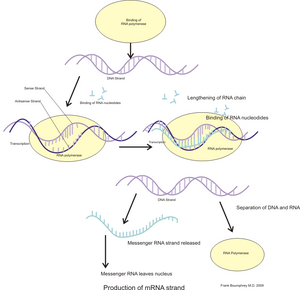Dr. Derrick J. Rossi (Children’s Hospital Boston) along with a team of researchers from Children’s, Harvard, MIT, and Boston University, published results in Cell demonstrating that skin cells can be reprogrammed into stem cells that seem virtually identical to embryonic ones. These cells can also be used to develop transplant organs. While very exciting, the issue is that we have found that iPS (induced Pluripotent Stem) cells are not totally identical to embryonic ones; the cells seem to retain some memory of their tissue of origin.
Instead of using viri to manipulate the cell back to its embryonic capabilities, messenger RNA (mRNA) was inserted to effect the conversion; an interferon inhibitor was also employed.  The mRNA are involved in transcription (the formation of RNA from the DNA template) and translation (the formation of proteins); these conversions occurs in ribosomes among the cytoplasm. In this case, the mRNA are involved in the translation of four key proteins (genes) that reprogram the cells into the iPS state. The time frame involved is about 17 days from start to finish (about ½ the time for the viral method) and this process produces some 50-100 times more iPS cells.
Studies were done to see if differences between these iPS and embryonic cells would be easily manifested. However, none were readily found. In addition, the cells have been converted into cardiomyocetes (heart muscle cells) from their stem cell state.








Lacie Scarp So, what do you find of interest? My writing depends upon which research projects involve me and what I am allowed to discuss (proprietary interests).
Thanks for writing.
Thanks dude. This was special knowing
Thanks pal. That has been interesting reading